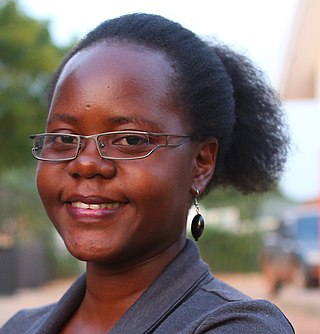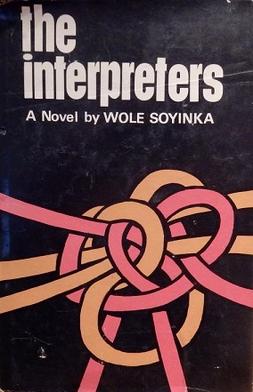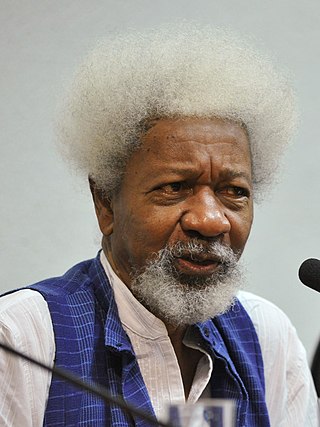
Akinwande Oluwole Babatunde "Wole" Soyinka is a Nigerian playwright, novelist, poet, and essayist in the English language. He was awarded the 1986 Nobel Prize in Literature for his "wide cultural perspective and... poetic overtones fashioning the drama of existence", the first sub-Saharan African to win the Prize in literature.
A Dance of the Forests is one of the most recognized of Wole Soyinka's plays. It was "presented at the Nigerian Independence celebrations in 1960, it ... denigrated the glorious African past and warned Nigerians and all Africans that their energies henceforth should be spent trying to avoid repeating the mistakes that have already been made."

Zahrah the Windseeker is a young adult fantasy novel and the debut novel of Nigerian American writer Nnedi Okorafor, published in September 2005. It incorporates Nigerian myths, folklore, and culture. It is the winner of the 2008 Wole Soyinka Prize for Literature in Africa.

Yoruba literature is the spoken and written literature of the Yoruba people, one of the largest ethno-linguistic groups in Nigeria and the rest of Africa. The Yoruba language is spoken in Nigeria, Benin, and Togo, as well as in dispersed Yoruba communities throughout the world.
The Strong Breed is one of the best-known plays by Wole Soyinka. It is a tragedy that ends with an individual sacrifice for the sake of a community's benefit. The play is centered on the tradition of egungun, a Yoruba festival tradition in which a scapegoat of the village carries out the evil of the community and is exiled from the civilization.
Abiku is a Yoruba word that can be translated as "predestined to death" and refers to the spirit of a child who dies young. It is from (abi) "that which was born" and (iku) "death".
Tanure Ojaide is a Nigerian poet and academic. As a writer, he is noted for his unique stylistic vision and for his intense criticism of imperialism, religion, and other issues. He is regarded as a socio-political and an ecocentric poet. He won the 2018 Wole Soyinka Prize for Literature in Africa with his collection Songs of Myself: A Quartet (2017).
Wole Soyinka Prize for Literature in Africa is a pan-African writing prize awarded biennially to the best literary work produced by an African. It was established by the Lumina Foundation in 2005 in honour of Africa's first Nobel Laureate in Literature, Wole Soyinka, who presents the prize, which is chosen by an international jury of literary figures. Administered by the Lumina Foundation, the prize has been described as "the African equivalent of the Nobel Prize".
Madmen and Specialists is a play by Wole Soyinka, conceived in 1970 during his imprisonment in the Nigerian Civil War. The play, Soyinka's eighth, has close links to the Theatre of the Absurd. Abiola Irele called it "a nightmarish image of our collective life as it appears to a detached and reflective consciousness". It was published in London 1971 by Methuen and in New York in 1972 by Hill & Wang.
William Farquhar Conton was a Sierra Leone Creole educator, historian and acclaimed novelist.
Sifiso Mzobe is a South African author.

Ber Anena born and previously published as Harriet Anena is a Ugandan writer and performer, whose writing includes poetry, nonfiction and fiction. She is the author of a collection of poems, A Nation In Labour, published in 2015, won the 2018 Wole Soyinka Prize for Literature in Africa. The Economist described her poetry performance as "an arresting evocation of love and war".

The Interpreters is a novel by Wole Soyinka, first published in London by André Deutsch in 1965 and later republished as part of the influential Heinemann African Writers Series. It is the first and one of the only three novels written by Soyinka; he is principally known as a playwright. The novel was written in English and later translated into a number of languages.

Ẹni Ògún is a biographical stage play performed in celebration of Wole Soyinka's 80th birthday in 2014. The play, which lasted for two days, was performed at Muson Centre and was written and directed by Wole Oguntokun.

Season of Anomy is the second novel by Nobel winning Nigerian playwright and critic Wole Soyinka. Published in 1973, it is one of only three novels published during Soyinka's highly productive literary career. Though highly studied as part of Soyinka's importance to the African literary canon, criticism of the novel has been mixed, with some critics describing the novel as a "failure".

Coconut is a 2007 novel by Kopano Matlwa. It tells the story of a young, black girl, and her life in Johannesburg's white suburbs. The book won the Dinaane Debut Fiction Award, and the Wole Soyinka Prize for Literature in Africa.

Chronicles from the Land of the Happiest People on Earth is a 2021 novel written by Nigerian playwright and novelist Wole Soyinka. It was released on 28 September 2021 by Bookcraft Africa.

The 1986 Nobel Prize in Literature was awarded to the Nigerian writer Wole Soyinka "who in a wide cultural perspective and with poetic overtones fashions the drama of existence." He is the first African recipient of the prize.
Mpalive-Hangson Msiska is a Malawian academic resident in London, England. He is a Reader Emeritus in English and Humanities at Birkbeck College, University of London, with research and teaching interests in critical and cultural theory as well as postcolonial literature, including African literature, Wole Soyinka and Chinua Achebe being notable subjects of his writing.

Of Africa is a book written by Wole Soyinka, a Nigerian playwright, novelist, poet, and essayist who is also the author of The Bacchae of Euripides (1969), Season of Anomy amongst others. The book was centered on Africa's culture, religion, history, imagination, and identity, examining how its past intertwines with that of others. He emphasizes Africa's intrinsic values, including its humanity, self-worth, and methods of environmental stewardship, encompassing both physical and intangible aspects. Despite acknowledging Africa's daunting challenges, Soyinka rejects defeatism, eloquently analyzing issues from historical significance to the rise of theocracy. He confronts complex topics like racial biases, inter-ethnic conflicts, and the impact of colonial-imposed borders on nationhood. Soyinka's examination reimagines Africa's place in the reader's mind, charting a path toward a future defined by peace and self-empowerment.











